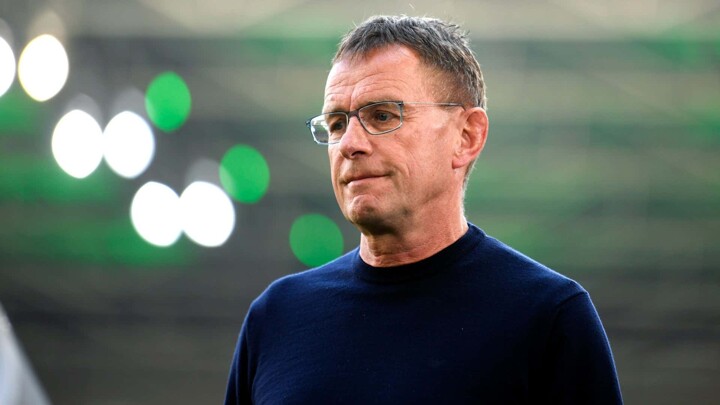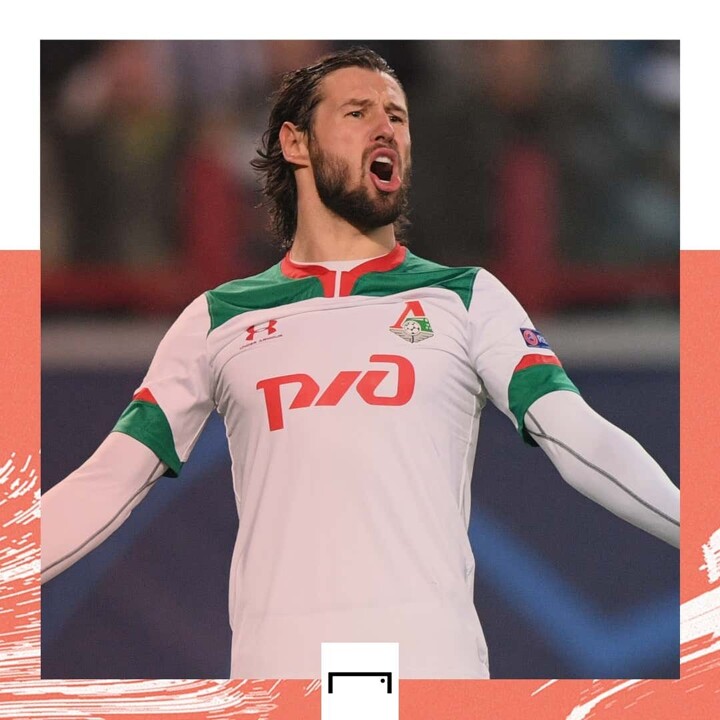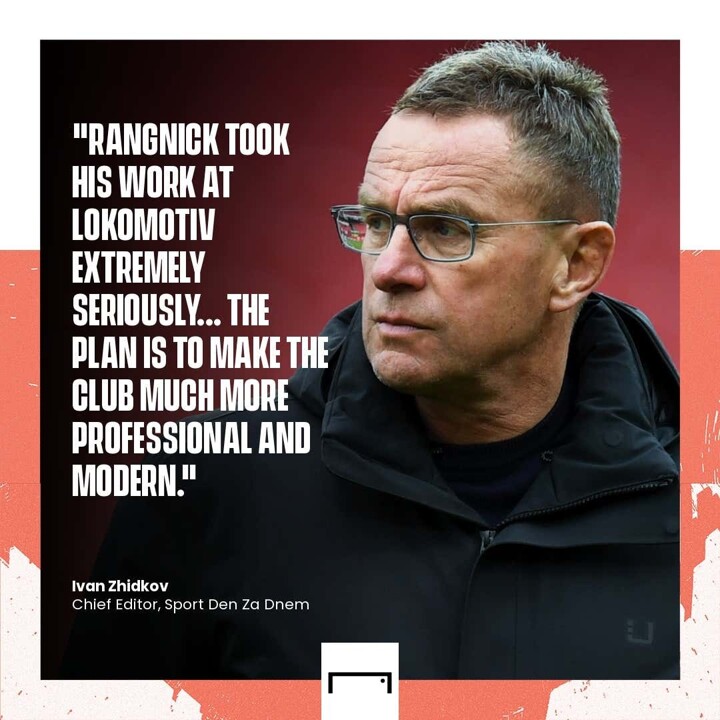Reason why Ragnick at Moscow was the biggest fraud in Russian football , this man did things that Russian football won’t forget ,be careful Manchester United.
Manchester United's new interim manager
only took on his role in Russia in July, but
faced heavy criticism from both fans and
members of the media.

If you had read the Russian press – and
especially Russian social networks –
in recent days, then you would have come
away with the impression that Ralf Rangnick's
work at Lokomotiv Moscow was hugely
unpopular.
Most journalists and fans are outraged
by the apparent damage the German
tactician did to the club, only for him to then
suddenly leave so as to take the interim
manager's job at Manchester United.
As described by Sergey Kolesnikov
of Sportbox.ru, some claim that Rangnick's
tenure has been "the biggest fraud in
Russian football history".
Dmitry Selyuk, the provocative agent best
known for representing Yaya Toure,
compared Rangnick to Ostap Bender,
the most famous fictional crook in Russian
literature.
Countless jokes and memes have
been spread far and wide, leaving Lokomotiv
to be laughed at mercilessly by rival
supporters.
Rangnick is being blamed for dismantling
a decent team that was fairly functional
last season, finishing third so as to qualify
for Europa League, while also winning
the Russian Cup.
But following a major summer overhaul
, they are now 11 points behind leaders
Zenit after just 16 matches, having won
just two of their last nine fixtures.
On Monday, they were soundly thrashed
3-1 by lowly Arsenal Tula.
Rangnick's first unpopular decision after
his appointment in July was selling midfield
stalwart Grzegorz Krychowiak against
the player's wishes. The Poland international
was bought by Lokomotiv's direct rivals
Krasnodar for just €2.5 million (£2.1m/$2.8m)
in early August, and is enjoying a
strong season, with four goals to
his name so far.

The list of summer signings, meanwhile
, included French midfielder Alexis Beka
Beka from Ligue 2 outfit Caen and Dutch
winger Gyrano Kerk from Utrecht, both
of whom cost €6m (£5m/$7m) each.
Lokomotiv also paid Moscow rivals
CSKA hefty sums for unproven midfielders
Konstantin Maradishvili and Nair
Tiknizyan, as pundits commented that
Rangnick's strategy in the transfer
market was both needlessly expensive
and risky.
It was not just with the playing staff
where Rangnick made unpopular
decisions, either.
Marko Nikolic was a popular coach
with Lokomotiv followers, and generally
considered a very hard working and honest
manager. His future, though, was in
doubt from the moment Rangnick arrived
, as his defensive style and lack of high
pressing was not suitable for the new
concepts that were being introduced.
It was hardly surprising, therefore, that
the Serbian left by mutual consent in
early October. He was replaced by Markus
Gisdol, who is largely seen by the Russian
media as being Rangnick's puppet.
Former Lokomotiv president Nikolay
Naumov criticised the appointment,
saying: "He is not a coach, but rather a
secretary. Rangnick doesn't need someone
like [Jose] Mourinho or [Roberto] Mancini
, but rather a man who will follow his
instructions.
"They came to the club with just one
goal – to turn Lokomotiv into a business
of buying and selling players. Results aren't
important for them, and they need
an anonymous coach who was willing
to take a good salary and do what they say."

Now, with Rangnick's departure to
United confirmed, it was widely assumed
that the whole system he brought in would
fall apart, leaving Lokomotiv in ruins.
Such a view, though, seems like it will
be proven incorrect, for no more reason
than Rangnick's role and his entire
project in Moscow has been totally
misunderstood.
For starters, despite the fact that he will
be in the Old Trafford dugout on Sunday
when Crystal Palace take on United,
Rangnick has not 'left' Lokomotiv – simply
because he never had an official job within
the club in the first place.
Described upon his appointment as the
club's manager of sports and development
, he was not actually on the Lokomotiv
payroll, and his name never appeared
on the official club website. Instead, a
contract was signed with his agency,
Rangnick Kornetka Consulting, which
basically made him a freelance advisor.
"The contract is still intact, and the project is
supposed to go on," Ivan Zhidkov, chief
editor of the Sport Den Za Dnem newspaper
, tells GOAL. "Lars Kornetka, Rangnick's
right-hand man, will continue to work with
Lokomotiv on a daily basis, and Rangnick
himself is supposed to have the last word
on the most important issues.
"Rangnick took his work at Lokomotiv
extremely seriously. He brought an entire
team of scouting specialists, who now
work for a club that didn't have a proper
scouting department at all before his arrival.
"There are new standards as far as
medical staff and dietitians are concerned.
The plan is to make the club much
more professional and modern."

Rangnick's appointment was always
done with a long-term view, and the transfer
market strategy, for example, is not - as
Naumov claimed - to be a selling club, but
rather to make the club more efficient while
excelling on the pitch.
"According to Rangnick's philosophy,
only ambitious young players should be
signed, and they shouldn't be over the age
of 25," Zhidkov explains. "Investments
should be made in those who want to grow,
rather than in veterans whose motivation
could be wrong for the project."
Rangnick made significant efforts to
explain the project during his time in
Russia. He held a special press conference
in the weeks before the news broke
of United's interest in him, but instead
of discussing the strategy and the future,
journalists kept asking the German about
Nikolic and Krychowiak, focusing
on the past.

He also invited leaders of fan movements
for a friendly chat at a restaurant in October
, but it remains unclear whether they were
convinced by his methods.
"It is very important to understand that
it is a long term project, led by top
specialists. It would be ridiculous to judge
it based on immediate results, but people
don't want to understand that," Zhidkov
continues. "Most of the journalism in
Russia is driven by pure emotion. Most
of the analysis is very shallow.
"It is already possible to see that Beka
Beka, for example, is making significant
progress, and at the age of 20 he is a very
promising footballer. These things take
time."
Rangnick is, therefore, completely
misunderstood in Russia, though it must
be said that the very vague description
of his role has not helped his cause.
His work at Lokomotiv has only just started
, and it was not supposed to end after
just four months when Manchester United
came calling. As such, success or
failure should not be measured
quite so soon.
Russian fans and journalists are only
capable of looking at immediate impressions,
though, and former Lokomotiv general
director Ilya Gerkus claimed that, "there
are three matches left in 2021. If the
Germans achieve good results, they will
continue. If they don't, they won't."
Rangnick is almost certain to face the
same problem in England, too. Despite
only being the interim manager at
United, he will inevitably be judged by
what happens on the field, even if the
true purpose for his appointment does
not begin until the summer.
That said, his role as a consultant
during the next two seasons is extremely
vague – even more so than at Lokomotiv
- and thus fans and journalists alike are
extremely unlikely to be patient with
him and trust his process if results
under the coach he helps to appoint
do not improve.
And so while Rangnick is definitely
not guilty of being "the biggest fraud
in Russian football history", and nor is
he a crook, there are lessons in what
he has done at Lokomotiv that Manchester
United fans would do well to learn
from in the coming weeks, months
and years.


Comments
Post a Comment